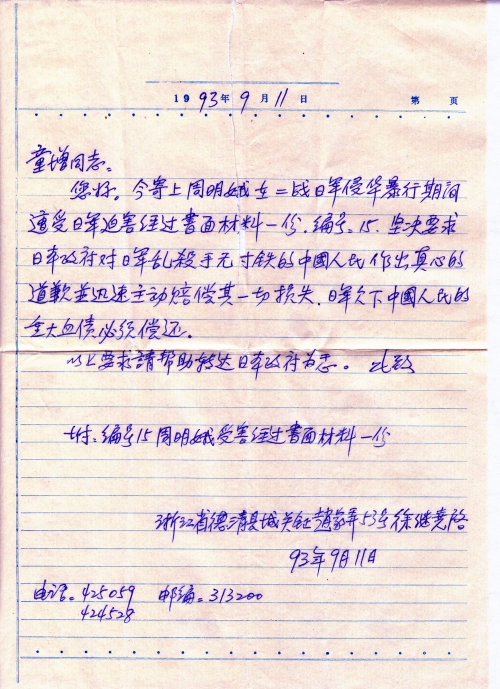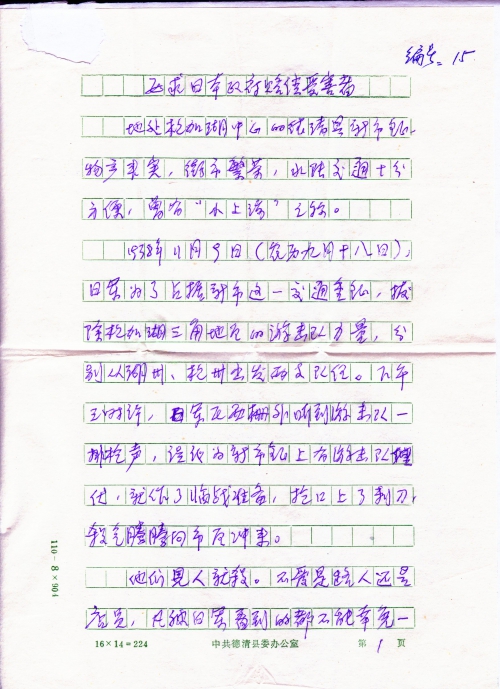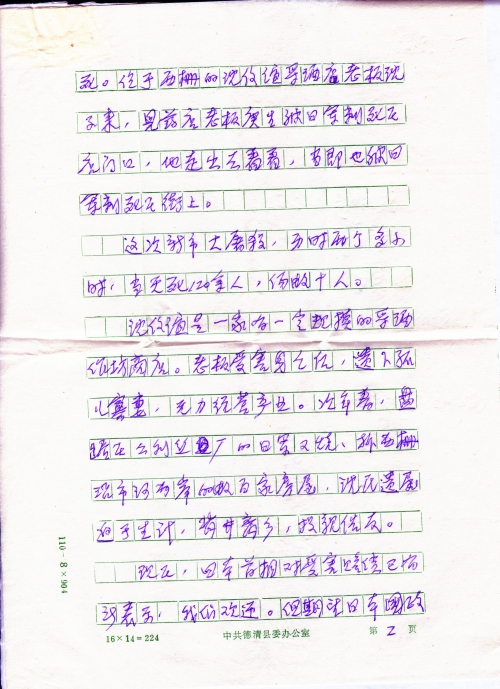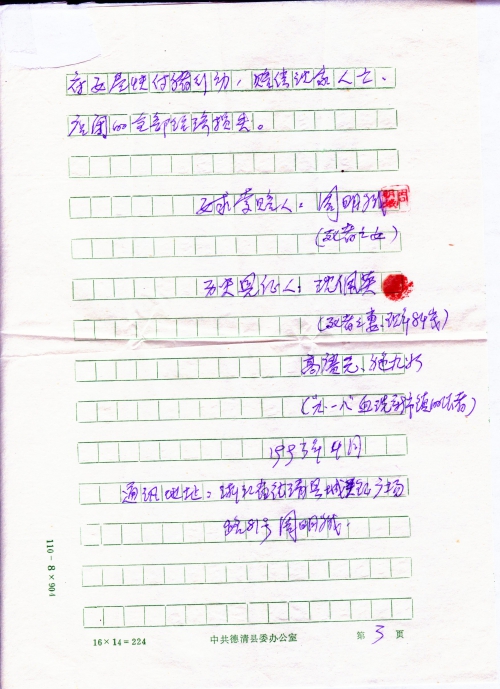Date of Letter:1993-09-11
Address of Author:Deqing County, Huzhou City, Zhejiang Province
Date of Event:1938-11
Location of Event:Deqing County, Huzhou City, Zhejiang Province
Name of Author:Zhou Mingcheng, Xu Jiyao
Name(s) of victim(s):Zhou Mingcheng’s family and townsmen
Type of atrocity:Other Massacres(OM)
Other Details:In November 1938, the Japanese troops occupied the new town of Deqing County, killing everyonee on the way. The massacre lasted for more than two hours and more than 120 people died on the day. Now we claim compensation from Japan. Our representative Zhou Mingcheng is the daughter of someone killed that day.
Comrade Tong Zeng:
How have you been?
I am sending a set of written copy of materials about Zhou Ming’e’s suffering caused by the invading Japanese army during the World War II, as. No. 15.: We firmly strongly demand the Japanese government to genuinely apologize to those unarmed Chinese people who were killed by the invading Japanese army and promptly, proactively compensate for their loss. The blood debt that the invading Japanese army owes to the Chinese people must be paid.
Please pass on the above request to the Japanese government. Thank you.
Attached is a copy set of the written materials about No.15 Zhou Ming’e’s suffering
Yours faithfully,
Xu Jiy Yaoqi
No. 53, Zhaojia Avenue, Chengguan, Deqing, Zhejiang
September 11, 1993
Telephone: 425059 Postal code: 313200
424528
Demanding the Japanese Government to Compensate the Victim
Xinshi Town, Deqing County, located at the center of Hangzhou, Jiaxing and Huzhou triangle, was rich in natural resources and had prosperous markets and convenient water and land transportation. It was once known as “Small Shanghai”.
On November 9, 1938 (lunar year of September 18), the Japanese army sent two groups of soldiers from Huzhou and Hangzhou respectively to occupy the transportation center Xinshi and remove the guerrilla force in the Hangzhou, Jiaxing and Huzhou triangle. At about three o’clock in the afternoon, the Japanese army heard gunshots of guerrillas outside Xizha and wrongfully thought there was a guerrilla ambush at Xinshi. So, they made preparations for a battle with knives attached to the guns and rushed into Xinshi.
They killed everyone they saw; it didn’t matter whether they were passers-by or shop assistants. No one seen by them survived. Shen Zilai, the boss of Shenxinyilu Hotel at Xizha saw Geng Sheng, the boss of a pharmacy store, being stabbed to death by the Japanese army at the gate of the store. He walked outside to see what’s happening and was also stabbed to death by the Japanese army.
The Xinshi Massacre lasted over 2 hours and killed over 120 people, leaving dozens of people injured.
Shen Xinyi owned a wine shop of a fairly decent size. He died and left his wife and children who were unable to manage the business. In the spring of the next year, the Japanese army that stayed at the Gonglisi Factory began to burn and demolish Xizha and hundreds of houses along the Shi River. Trying to survive, Shen Xinyi’s widow was forced to leave the hometown and seek help from relatives and friends.
Now, we welcome the recent new position that the Japanese prime minister has taken about the compensation. But we hope that the Japanese government will promptly put into act to compensate for Shen Xinyi’s death and economic lost from his death and the damage of his store and business.
Claimant: Zhou Ming’e (Personal seal)
(Daughter of the dead) (Personal seal)
Witness: Shen Peiying (Fingerprint) (Wife of the dead, 84 years old)
Gao Gengyuan, Shi Jiuru (authors of September Xinshi Bloodbath)
April 1993
Address: Zhou Ming’e, No. 81, Guangchang Road, Chengguan, Deqing, Zhejiang


















